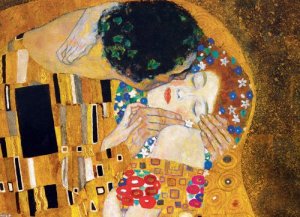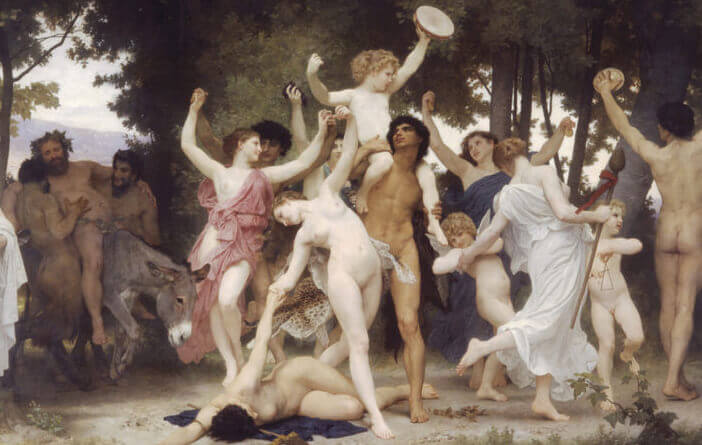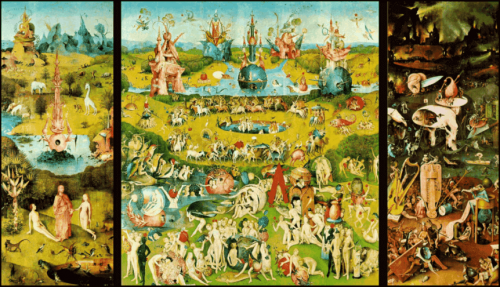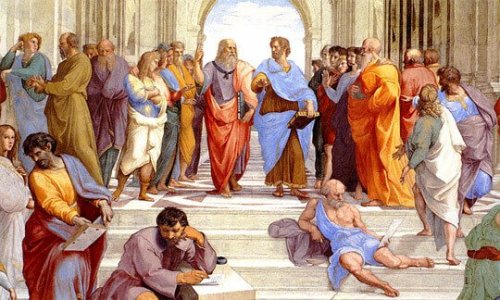Pleasure: The Devil's Invention?


Written and verified by the psychologist Gema Sánchez Cuevas
Pleasure, the immediate reward, is the devil’s invention, a universal invention. The center of the biological universe consists of enjoyment, reward, and avoiding pain. This is an idea burned into the deepest part of all living beings on our planet. This idea was present at the beginning of life itself.
It’s a diabolical idea because every living being is born with the drive to move towards everything that produces delight, gratitude, and well-being. Examples of this are food, drink, sex, sleep, and avoidance of heat and cold.
Pleasure is the reward of these successful behaviors. We’re programmed to seek it and avoid suffering. In mankind, enjoyment, desire, and immediate or future gratification touch everything.

The origins of pleasure
Pleasure is a feeling we seek. We want to take it to the conscious level and keep it there. For many, the idea of pleasure could be born from that bitten apple in paradise. However, it doesn’t seem to begin with temptation. If this were the case, it would have been born from darkness and uncertainty.
All living beings revolve around their survival. This means eating, drinking, and reproducing. These behaviors obey the idea of reward and delight.
For many, the idea of pleasure could well have begun with that poisonous apple with which Eve tempted Adam.
No living being, however primitive, eats without hunger, nor drinks without thirst. It’s not rewarding or pleasant. They do so only if they’re hungry or thirsty. Only in this way does acquiring pleasure precede these behaviors. The same happens with sexual activity. Pleasure is the idea burned into the organism of every living being. First, it’s programmed in the cells. Later on, in multi-cellular beings without brains. Finally, in the brain of human beings.
What or who had the brilliant idea of pleasure? Who came up with this genius idea? Nobody knows for sure. In any case, it seems evident that the biological world, our only real world, has revolved around this central idea.

Pleasure lies in the brain
The brain is like a chest that jealously guards the sacred codes that drive us to do things with the objective of getting pleasure and rewards. They’re unwritten codes, embodied in neuronal connections, electrical signals, and neurotransmitters.
Why doesn’t a rat abstain from pulling a lever to electrically stimulate parts of its brain? Are there areas of the brain we could artificially stimulate to produce pleasure? The answer to these questions is yes. A resounding yes. An animal pulls a lever to stimulate its brain with electrical impulses because that activates the cerebral circuits of pleasure.
The brain is like a chest that jealously guards the sacred codes that drive us to do things with the objective of getting pleasure and rewards.
It doesn’t have to be such an “experimental” example. A good meal or an orgasm also stimulates these brain circuits. Surprisingly, the reward obtained from the artificial electrical stimulus doesn’t satiate. The animal persistently continues pulling the lever to obtain its reward: pleasure. What’s going on? Could we call the pleasure obtained from these artificial stimuli “pure pleasure”?
Pleasure serves the organism’s needs
It seems that the organism uses pleasure as a means of exchange. According to the means, the brain activates some behaviors and not others. Imagine that an animal has to choose between two or three imperative needs. In the face of this conflict, the animal will probably first choose whichever, gives it more pleasure.
The surprising thing is that this usually coincides with what’s most necessary, biologically speaking, for the organism. That’s why it’s said that pleasure serves the organism’s needs.

Pleasures that evoke beauty
In human beings, many more types of pleasure develop. Those pleasures evoke what we call beauty. Beauty can begin with just a word. There are speakers and writers who evoke feelings of well-being and pleasure. But we also find beauty when we contemplate a painting, caress a beautiful sculpture, or observe an incredible work of architecture. We also encounter this feeling when we hear a beautiful symphony. And there are many more examples!
The destructive pleasure of drugs
People can also get pleasure from doing drugs. This kind of pleasure poses a final challenge to the very limits of human nature. Why is addiction developed from this type of pleasure if it’s so destructive? Although it seems stupid…. why does heroin addiction develop but not an addiction to eating apples if both are rewarding?
The answer to these questions begins with this statement: the basic reward and pleasure brain circuits are nonspecific. This means that both natural sensory stimuli and all those artificial ones that have the capacity to interact with the chemical receptors in neurons can both activate them.
This would explain why unnatural chemicals (exogenous drugs) can artificially activate the pleasure circuits. And not only in the human brain but in any other animal with a brain. However, this can be like a double-edged sword. The heads and tails of enjoyment.
What do you think? Is seeking pleasure beneficial or detrimental to us? People have mixed opinions about this. Maybe the answer is affirmative in both cases. In any case, there’s no single truth. This is the wonderful thing about the mind!
Pleasure, the immediate reward, is the devil’s invention, a universal invention. The center of the biological universe consists of enjoyment, reward, and avoiding pain. This is an idea burned into the deepest part of all living beings on our planet. This idea was present at the beginning of life itself.
It’s a diabolical idea because every living being is born with the drive to move towards everything that produces delight, gratitude, and well-being. Examples of this are food, drink, sex, sleep, and avoidance of heat and cold.
Pleasure is the reward of these successful behaviors. We’re programmed to seek it and avoid suffering. In mankind, enjoyment, desire, and immediate or future gratification touch everything.

The origins of pleasure
Pleasure is a feeling we seek. We want to take it to the conscious level and keep it there. For many, the idea of pleasure could be born from that bitten apple in paradise. However, it doesn’t seem to begin with temptation. If this were the case, it would have been born from darkness and uncertainty.
All living beings revolve around their survival. This means eating, drinking, and reproducing. These behaviors obey the idea of reward and delight.
For many, the idea of pleasure could well have begun with that poisonous apple with which Eve tempted Adam.
No living being, however primitive, eats without hunger, nor drinks without thirst. It’s not rewarding or pleasant. They do so only if they’re hungry or thirsty. Only in this way does acquiring pleasure precede these behaviors. The same happens with sexual activity. Pleasure is the idea burned into the organism of every living being. First, it’s programmed in the cells. Later on, in multi-cellular beings without brains. Finally, in the brain of human beings.
What or who had the brilliant idea of pleasure? Who came up with this genius idea? Nobody knows for sure. In any case, it seems evident that the biological world, our only real world, has revolved around this central idea.

Pleasure lies in the brain
The brain is like a chest that jealously guards the sacred codes that drive us to do things with the objective of getting pleasure and rewards. They’re unwritten codes, embodied in neuronal connections, electrical signals, and neurotransmitters.
Why doesn’t a rat abstain from pulling a lever to electrically stimulate parts of its brain? Are there areas of the brain we could artificially stimulate to produce pleasure? The answer to these questions is yes. A resounding yes. An animal pulls a lever to stimulate its brain with electrical impulses because that activates the cerebral circuits of pleasure.
The brain is like a chest that jealously guards the sacred codes that drive us to do things with the objective of getting pleasure and rewards.
It doesn’t have to be such an “experimental” example. A good meal or an orgasm also stimulates these brain circuits. Surprisingly, the reward obtained from the artificial electrical stimulus doesn’t satiate. The animal persistently continues pulling the lever to obtain its reward: pleasure. What’s going on? Could we call the pleasure obtained from these artificial stimuli “pure pleasure”?
Pleasure serves the organism’s needs
It seems that the organism uses pleasure as a means of exchange. According to the means, the brain activates some behaviors and not others. Imagine that an animal has to choose between two or three imperative needs. In the face of this conflict, the animal will probably first choose whichever, gives it more pleasure.
The surprising thing is that this usually coincides with what’s most necessary, biologically speaking, for the organism. That’s why it’s said that pleasure serves the organism’s needs.

Pleasures that evoke beauty
In human beings, many more types of pleasure develop. Those pleasures evoke what we call beauty. Beauty can begin with just a word. There are speakers and writers who evoke feelings of well-being and pleasure. But we also find beauty when we contemplate a painting, caress a beautiful sculpture, or observe an incredible work of architecture. We also encounter this feeling when we hear a beautiful symphony. And there are many more examples!
The destructive pleasure of drugs
People can also get pleasure from doing drugs. This kind of pleasure poses a final challenge to the very limits of human nature. Why is addiction developed from this type of pleasure if it’s so destructive? Although it seems stupid…. why does heroin addiction develop but not an addiction to eating apples if both are rewarding?
The answer to these questions begins with this statement: the basic reward and pleasure brain circuits are nonspecific. This means that both natural sensory stimuli and all those artificial ones that have the capacity to interact with the chemical receptors in neurons can both activate them.
This would explain why unnatural chemicals (exogenous drugs) can artificially activate the pleasure circuits. And not only in the human brain but in any other animal with a brain. However, this can be like a double-edged sword. The heads and tails of enjoyment.
What do you think? Is seeking pleasure beneficial or detrimental to us? People have mixed opinions about this. Maybe the answer is affirmative in both cases. In any case, there’s no single truth. This is the wonderful thing about the mind!
All cited sources were thoroughly reviewed by our team to ensure their quality, reliability, currency, and validity. The bibliography of this article was considered reliable and of academic or scientific accuracy.
Higgins, E. T. (1997). Beyond pleasure and pain. American Psychologist. https://doi.org/10.1037/0003-066X.52.12.1280
This text is provided for informational purposes only and does not replace consultation with a professional. If in doubt, consult your specialist.







